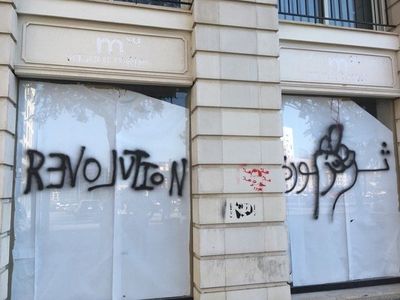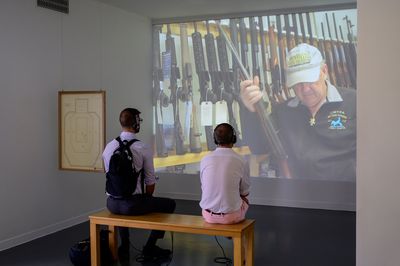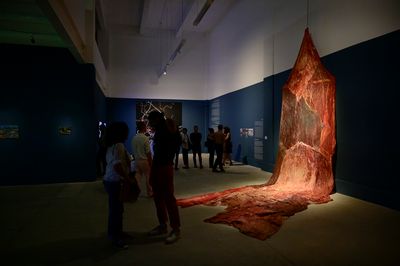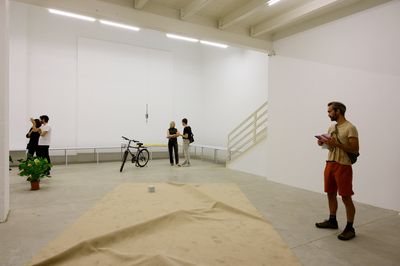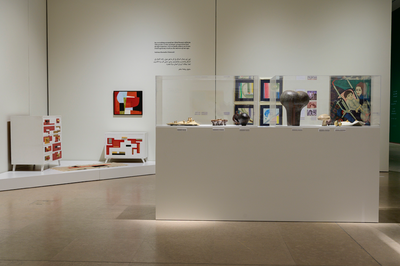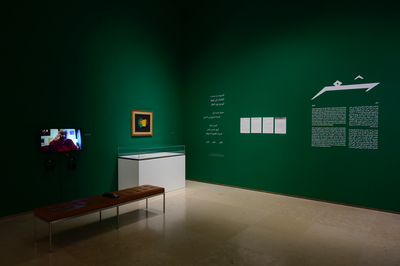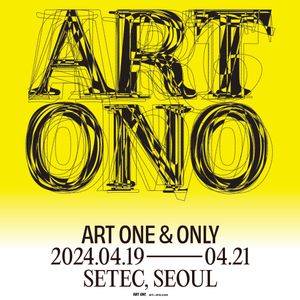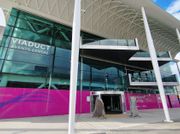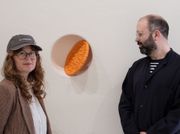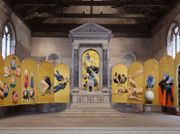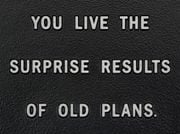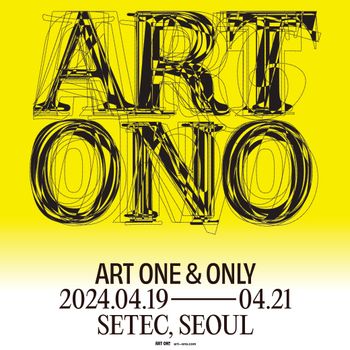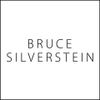From the Gallery to the Streets: Home Works 8 in Beirut
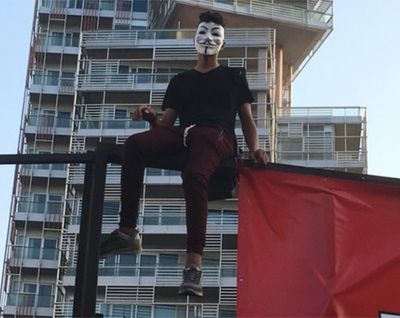
Demonstrations in Downtown Beirut, 20 October 2019. Photo: Nat Muller.
There's an inside joke amongst the team of Ashkal Alwan, The Lebanese Association for Plastic Arts: that every time an edition of its biennial forum on cultural practices is planned, a national crisis happens. The eighth edition of Home Works was no different: it opened on 17 October amidst the most devastating wildfires that Lebanon had witnessed in decades and a looming economic crisis.
This was to be one of Ashkal Alwan's most ambitious editions of Home Works to date, with eight exhibitions spread across town and an impressive public programme. Plus the Lebanese premiers of a range of homegrown artists living in the diaspora, including Borborygmus, playwright and performer duo Lina Majdalanie and Rabih Mroué's collaboration with musician and graphic artist Mazen Kerbaj; sound artists Tarek Atoui and Eric La Casa's collaboration with the School for the Deaf and Communication Disorders in Sidon in South-Lebanon; and filmmakers and artist duo Joana Hadjithomas and Khalil Joreige's lecture-performance Vertigo, based on the project that won them the Prix Marcel Duchamp in 2017. None of it came to pass.
As the HW8 opening reception drew to a close, reports started trickling in of demonstrations in downtown Beirut. Initially a reaction to an ill-conceived tax on VoIP services, protests across Lebanon began to swell, with people coming together across class and sectarian divides to call for an end to the corruption and clientelism of a political elite accused of lining its pockets on the backs of the people since the end of the Civil War in 1990. These ongoing demonstrations are largely peaceful and the mood festive, but public anger is palpable, with demands for political reform, improvement of Lebanon's failing public infrastructure (from electricity outages, lack of sanitation, to faulty waste management), and solutions to the country's soaring debt and income inequality.
In response, Ashkal Alwan released a defiant communiqué issued on 21 October:
We do not regret to inform you that Ashkal Alwan is indefinitely postponing all programmes and events scheduled to take place from October 17—27, 2019 as part of the 8th edition of Home Works: A Forum on Cultural Practices. [...] Our artistic, intellectual, and organizational energy will be redirected towards the achievement of our hopes and aspirations, the possibility of which is being granted to us by a momentum that should be seized at any cost. See you on the streets.
I was fortunate to tag along when some of the institutions opened their doors for a few hours to a colleague. The few exhibitions I saw cannot possibly reflect the full ambition of the HW8 programme, but they do offer a taste of what could have been as a curatorial framework centred broadly on radical imaginaries and 'the emancipatory potentialities of collective world-building' played out on the streets.
Some works became even more prescient in the light of unfolding events. For example, Omar Mismar's tongue-in-cheek video Schmitt, You and Me (2016—2017) at Agial Art Gallery, shows the artist befriending the owner and manager of a gun shop in Maine. He asks both men to read excerpts from a historical text on enmity, The Concept of the Political (1932), by German political theorist and member of the Nazi party Carl Schmitt. Both men struggle with Schmitt's conceptual and archaic language and their own performance in front of the camera. Mismar patiently directs them, take after take, stumble after stumble, with the rehearsal and repetition of Schmitt's words not only producing an estranging effect, but also encouraging the three men to talk about what these words might mean. Ironically, the power relations between two armed, white American men—they are in a gun shop after all—and an unarmed Arab man are turned upside down. Who is the friend, who is the enemy, and who is Othered? In the context of protests piercing through social, gender, and class differences, this work rang particularly strong.
Issues of alienation and the reconfiguration of power relations also fed through Nora Razian's group show I will Return, and I Will be Millions at the Beirut Art Center (BAC). Veering between the poetic and the didactic, this eco-critical exhibition drew on discourses around the Anthropocene and the marginalisation of non-human subjectivity. It is a big subject to be carried by only six artists with very different approaches, and the presentation did not always fully find its feet.
Dala Nasser's HW8 commission Mineral Lick (2019) stood out as a timely reminder of how in Lebanon, specifically Beirut, the distribution of water (or lack thereof) is entangled with graft and sectarianism. The artist used water, plants, and other materials from spillage sites around Beirut to dye large fabrics to produce 'paintings' that look meaty and bloodied with bacteria, minerals, and other active components—a hydro-cartography of Beirut that is as grisly as it is haunting.
Another discerning work in this show was Tuấn Andrew Nguyễn's two-channel video installation My Ailing Beliefs Can Cure Your Wretched Desires (2017), which is set up as an anthropomorphised conversation between the last Javanese rhino and a turtle. While these two animals ponder human greed, exploitation of the animal kingdom, Vietnamese politics, and ecological extinction; the viewer is treated to a host of images showing animals revered as gods, in captivity, slaughtered at meat markets and processed for traditional medicine. It is visceral, but disturbingly tinged with something magical too.
Also on view at BAC, Lebanese artist Charbel-joseph H. Boutros transformed the complex—and to the public often invisible—intricacies between artistic and institutional practice into an abstract landscape for his solo show The Distance Between Your eyes and the Sun. A catwalk made from tables hugged the circumference of the exhibition space, only to be walked on by BAC staff; a granite slab had the name of the first visitor entering the show carved into it, a second slab awaiting the name of the last visitor to see the show; two hollow concrete cylinders covered with a carpet represented the combined weight of BAC's founders; a small glass sphere containing Boutros' gallerist's tear mixed with sea water sits opposite an architectural model of an unrealised museum.
Boutros' intervention exemplified the interconnectedness between artist-artwork-institution, but also hinted at what falls between the cracks and remains unseen. This is an exhibition that needed copious consultation with the exhibition brochure, or in our case an impromptu guided tour by BAC's administrative director Rana Nasser Eddin.
The historical exhibition on influential but underrepresented Lebanese artist and writer Helen Khal (1923—2009) at the Sursock Museum could be seen as a foil to Boutros' show—at least in terms of how it divulges information and opens itself to the viewer. Accompanied by informative wall texts, archival material, photos, letters, and other documentation, curators Carla Chammas and Rachel Dedman did an excellent job at contextualising and positioning Khal and her contemporaries in the Lebanese literary and art scene of the 1960s and 1970s.
Similar to Boutros' proposition, Khal's work is not presented in isolation, but rather framed through the networks of friendship, the interdisciplinary hats she wore between writing and visual art, and the to-and-fro between studio practice and the founding of Gallery One. What emerges is an engaging snapshot of the artistic landscape in Lebanon's so-called Golden Age that also starts to redress the idea that this was true for everybody. Khal and many of her contemporaries, which included Shafic Abboud, Etel Adnan, Huguette Caland, Saloua Raouda Choucair, Simone Fattal, and Aref Rayess, were able to thrive and experiment with their practices as well as their lifestyles because they belonged to a specific social class. For many other Lebanese this was simply not the case—a poignant reminder of the inequality that has emerged as one of the main grievances in Lebanon's popular uprising.
As Lebanon enters yet another volatile period with an uncertain future, the walls between cultural organisations and the streets have become porous, with Ashkal Alwan taking a stand by joining the protests rather than go forward with its Home Works programme. Artists and cultural institutions have pulled together in unison and solidarity, which is no small feat in a city riven by divisions. Here's to hoping that the momentum and energy of the past few weeks will carry through. For now, there is no return to business as usual and the doors to exhibition venues remain shut. —[O]

